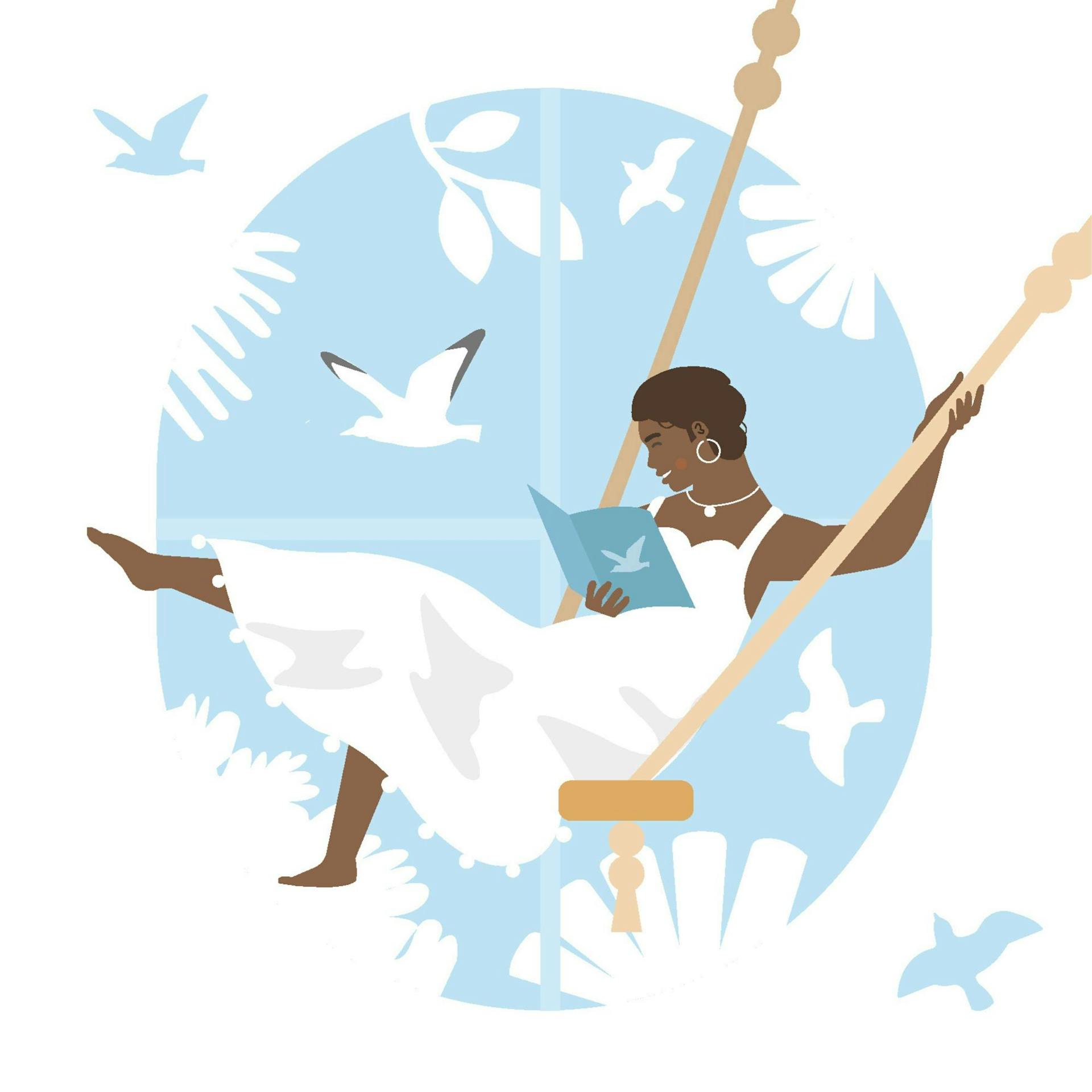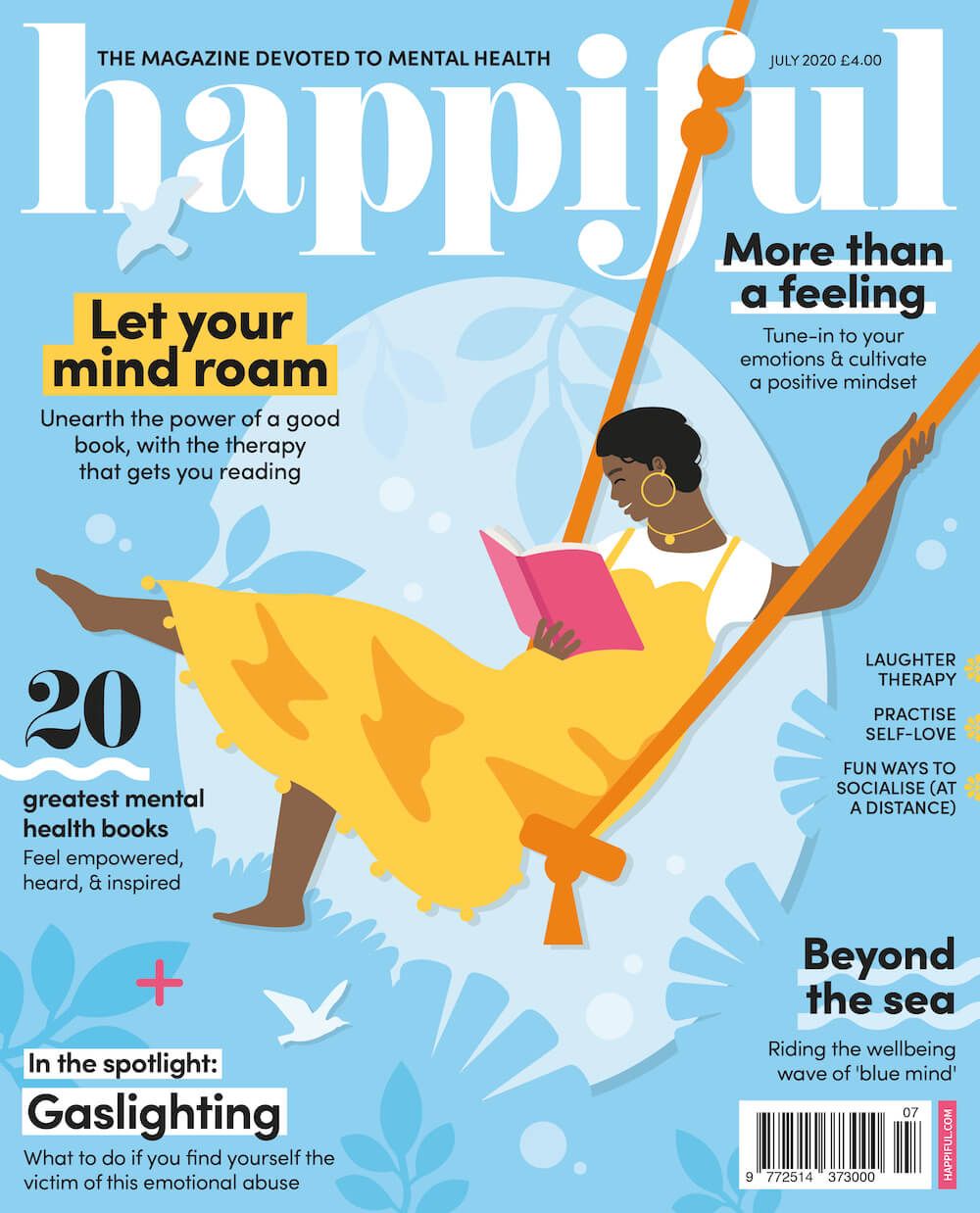
Stories have the ability to guide us through life’s biggest challenges, and offer an escape when we need it most. Bibliotherapy is the practice that prescribes clients reading lists based on their needs and circumstances. But how does it work?
Find more exclusive wellbeing content in Happiful magazine's July 2020 issue. Order your printed copy to be delivered straight to your door, or subscribe for our free digital edition.
How did you feel when ‘the famous five’ discovered the map for Kirrin Castle? When Cathy’s ghostly arms broke through Heathcliff’s window panes? When Hagrid finally delivered the letter from Hogwarts – “You’re a wizard, Harry.” What book ignited your senses, and transported you to another place?
Books have the power to unlock experiences that are usually beyond our reach. They teach us lessons, masterfully guide our emotional responses, and reflect our own realities back at us – so we don’t have to feel so alone.
The right book at the right time can inspire us and make us feel seen. But why leave it to chance? That’s the philosophy behind bibliotherapy – a service where a therapist prescribes reading lists to clients, based on their needs and situations, in the hope of prompting them to unhitch the answers they’re looking for.
“Susan Elderkin and I thought we had invented it when we first had the idea in 2008,” says bibliotherapist Ella Berthoud, as she reflects on where it all began. “We then discovered that people have been doing it since the time of Plato! But we were always passionate about giving people the right book at the right time for their circumstances, and had been practising on each other since we were at Cambridge together.”

Illustration | Rosan Magar
Ella and Susan continued to prescribe books to friends and family before eventually realising that it was something that they could do as a profession.
“We bring the joy of books to people who may have become jaded from reading too much of the same kind of literature, or who have lost the habit of reading completely, or who needed some kind of literary boost that they did not know how to find – like a medical practitioner giving someone the right drug, realising that it is exactly what they need,” Ella explains.
And research into the power of reading agrees. A study by Dr David Lewis showed that reading for just six minutes a day can reduce stress levels by 60%, lowering your heart rate, easing muscle tension, and soothing your mind. In addition, reading before bed can help us fall asleep, and a report by The Reading Agency found that it also increases empathy and a sense of connectivity. But, from what Ella has seen over the years, the studies show just half of the story.
“People seek bibliotherapy for all kinds of reasons, from feeling like they are stuck in a book rut, to having a real-life issue that they want to address,” she explains. “People come to us when they are bereaved, when they are about to go travelling, when they are about to retire, have their first child, are considering having an affair and don’t know what to do – all kinds of life situations.”
The very act of reading forces you to step aside from the chores for a while, and spend time with yourself
And Ella tailors each session to her client’s unique needs with a simple process. The client fills out a questionnaire where Ella asks various questions about their reading, and the current events in their life. Once it’s returned, Ella books a face-to-face session either a video call or in-person – where she and the client talk for up to an hour about their answers. Following on from that, she then sends a prescription of six books to the client – a list of books, and the reasons why they have been chosen for them.
“The very act of reading forces you to step aside from the chores for a while, and spend time with yourself,” says Ella, as she reflects on the specifics of how bibliotherapy supports her clients. “Being transported is very good for an overactive mind, and because reading a novel requires you to maintain focus for an extended period, it has a calming effect akin to meditation. And if you are reading a book that happens to speak to your situation, then even better.”
When I reflect on the books that shaped my own life I first think of Jacqueline Wilson’s The Suitcase Kid as I navigated the hurdles of divorce as a child, then Wuthering Heights for my teenage angst, and The Vegetarian by Han Kang as I made my way into the big, wide world. Ella points to Jitterbug Perfume by Tom Robbins which she read in her youth, José Saramago’s Blindness the year before she got married, and The Heart and the Bottle – a children’s book by Oliver Jeffers – which she read after her mother died, and which helped her understand grief.

Illustration | Rosan Magar
Of course, no matter how powerful they can be, books are just one part of good mental health – and while the sum total of human experience is out there for us to learn from and find comfort in, when the time comes for professional help – be that counselling or support from a GP – it should be taken.
Read for pleasure, or for the adventure, the thrill, and the romance. Read about characters overcoming adversity, thriving through it, or living alongside it in real and human ways. Cherish your book’s crisp pages and creaseless spines, or love them till they’re dog-eared and worn. However you do it, and whatever you learn along the way, find joy in reading – wellbeing is an open book.
Find out more about Ella’s work at ellaberthoud.com
For more empowering content, including laughter therapy and self-love tips, pick up the July issue of Happiful in our shop now, or in supermarkets from Thursday 18 June, or subscribe to read for free online.

3 Ways to Get Happiful Magazine
Happiful shop: Can't see your copy of Happiful in a store near you? Head to our online shop.
In-store: Pick up your copy in Waitrose, Tesco, Morrisons, Sainsbury's, WH Smiths Travel, Asda or selected newsagents. Find a store near you.
Online: Happiful is completely free to read digitally. To get our July issue in your inbox this Thursday, subscribe now.
Illustration | Rosan Magar

